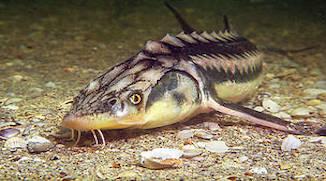New generation of wild sturgeons found in the Lower Danube

A new generation of wild sturgeon in the Danube has been discovered by WWF Bulgaria specialists thanks to long-term monitoring of the river. This summer they caught two “baby” sturgeons near the village of Vetren in northeastern Bulgaria. This discovery shows that the river is still a natural refuge for sturgeon populations that are capable of reproducing.
Apparently, these populations are not very large, because the two young sturgeons were caught only after a month of fruitless checks of empty nets.
Sturgeons have outlived even the dinosaurs, and now the former “Lords of the Danube” can only be found in parts of the river in Bulgaria, Romania, Ukraine and small parts of Serbia. Two of the six species of Danube sturgeon are now considered extinct (European sturgeon and thornback sturgeon), three of them are critically endangered (beluga, Russian sturgeon and stellate sturgeon) and one is endangered (sterlet). Obstacles on the river in the form of the Iron Gates hydroelectric power station, overfishing and pollution of the Danube have led to the sturgeon being on the verge of extinction.
This season, WWF Bulgaria experts caught two sturgeon species – a stellate sturgeon (20 cm long) and a sterlet (22 cm). Both specimens are unmarked, which makes it possible to determine that they are truly wild. Unlike the 50,000 sterlet babies that were released by WWF Bulgaria last fall and this spring. The latter were hatched in artificial conditions from "wild" parents.
Experts believe that these two fish, which were caught in early April, are about three months old. They were named July (stellate sturgeon) and Vetren (sterlet). After measuring, marking and taking genetic samples, they were released back into the Danube. The stellate sturgeon will continue its journey to the Black Sea and will arrive there in October.
In addition, during the celebration of Danube Day on June 29, 2015, WWF experts caught a small beluga named Apostol. Apostol and July will spend at least 10-15 years in the Black Sea before returning to the Danube to have their offspring. The sterlet will remain in the river all this time, because it is the only non-migratory species of Danube sturgeon.
Whether the Danube will continue to be home to sturgeons, including the largest freshwater fish in the world - the beluga, depends only on the efforts made by the Lower Danube countries to protect these species.
https://wwf.ua/?251791%2Fnewdanubesturgeongeneration
Уважаемый клиент!
В связи с новогодними праздниками с 30.12.2019 года по 08.01.2020 года включительно, заказы не принимаются.
При заказе товара сегодня, его оформление будет осуществлено 09.01.2020 года!
Всех поздравляем с Новым Годом 2020 и Рождеством Христовым! Желаем Вам осуществления всех заветных желаний, достатка, любви и благополучия !!!!!
Друзья всех поздравляем с праздниками, желаем мира, здоровья и довольства!
Заказы принимаем до 17 часов 30.12 с отправкой сегодня.
Остальные заказы будут отправлены с 03.01.23 максимально быстро.
All orders received after 4:00 PM on December 30, 2025 will be processed and shipped on January 5, 2026.
Happy New Year!
All orders received before 17:00 30.12.2020
All orders received after the specified period will be processed before 01/05/2022
You are being redirected
to the payment page








